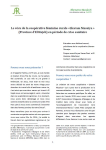Catégories
Documents disponibles dans cette catégorie (54)
 Ajouter le résultat dans votre panier Affiner la recherche
Ajouter le résultat dans votre panier Affiner la recherche
Article
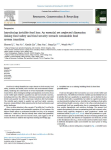
Article
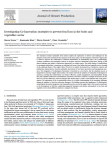
Article
M. Nasso ; E. Blasi ; F. Pezzoli ; C. Cicatiello |The transition towards sustainable food systems implies the exploration of drivers and challenges for the adoption of innovative solutions by the operators on the value chains. The development of innovative approaches is critical to improve the [...]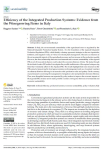
Article
The global food system has three recognized challenges: (a) increasing the availability of food for consumption; (b) reducing food loss; and (c) reducing food waste. The increasing demand for food for consumption, the increasing quantity of food[...]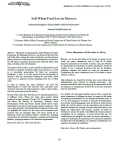
Article
Taking the recommendations of the Regional Strategic Framework for Reducing Food Loss and Waste in the Near East and North Africa region, this study specifically, provides decision makers in Morocco with the necessary information to cut food los[...]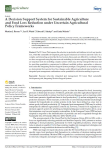
Article
The EU Green Deal requires the reduction in pesticides and fertilisers in food crop production, whilst the sustainable development goals require reductions in food loss and food waste. In a complex and interacting system like the food system, th[...]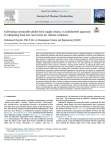
Article
In the current global landscape, food loss and waste (FLW) persist as a significant challenge, accounting for one-third of global food production and directly impacting 700 million individuals. Beyond its social ramifications, FLW incurs substan[...]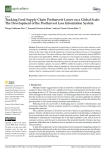
Article
Reducing food losses presents an opportunity to enhance food security, minimize waste, and improve profitability within the production sector. Creating awareness among various stakeholders in the value chain about the significance of reducing po[...]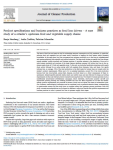
Article
The issue of food loss and waste is vital for minimising resource consumption and CO2 emissions. In particular, reducing fruit and vegetable loss and waste would contribute to keeping the food system within planetary boundaries. At the same time[...]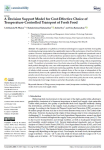
Article
A decision support model for cost-effective choice of temperature-controlled transport of fresh food
L.M. Maiyar ; R. Ramanathan ; I. Roy ; U. Ramanathan |The application of a plethora of wireless technologies to support real-time food quality monitoring during transportation has significantly improved the performance of fresh food delivery systems. However, deployment of these technologies increa[...]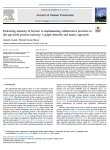
Article
In the fight against hunger and malnutrition, food and nutritional insecurity are major global issues. The agri-fresh produce sector has the potential to feed billions of people healthier meals and reduce malnutrition. However, achieving food an[...]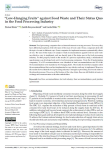
Article
Food processing companies have a financial interest in saving resources. However, they have different perceptions of the relevance of the issue of food waste. Hence, companies deal with the topic of waste in different ways. Some companies do imp[...]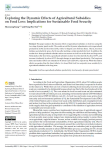
Article
This paper analyzes the dynamic effects of agricultural subsidies on food loss using the two-stage dynamic panel model. The results reveal that dynamic adjustments exist in agricultural productivity (0.56) and food loss (0.58), with a U-shaped c[...]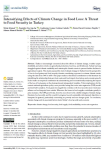
Article
Turkey is increasingly concerned about the effects of climate change, weather unpredictability, and severe events on agricultural production, food loss, and livelihoods. Turkey has long struggled against climate variability and catastrophic clim[...]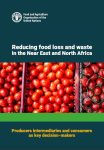
Rapport, Expertise, Working Paper
G. Anríquez ; W. Foster ; J. Santos Rocha ; J. Ortega ; J. Smolak ; S. Jansen | Le Caire [Égypte] : FAO | 2023Food loss and waste (FLW) reduction is an important component in the transformation of the region’s agrifood systems. Addressing the drivers of FLW along value chains provides an opportunity to tackle some of the inherent problems within the NEN[...]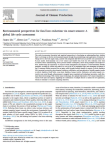
Article
Environmental perspectives for food loss reduction via smart sensors: a global life cycle assessment
This study incorporates theoretical and empirical perspectives in developing an understanding that, whether there is a leverage on the key environmental impacts through the potential large-scale application of Internet of Things (IoT) in the foo[...]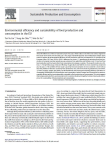
Article
T.-Y. Lin ; Y.-H. Chiu ; W.-Z. Xu |About 88 million tons of food is wasted in Europe every year, which makes it one of the most serious regions for food waste in the world. This research uses a two-stage undesirable dynamic data envelopment analysis (DEA) model to explore the env[...]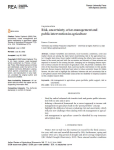
Article
Climate variability and extremes, socio-economic conditions, crisis and market shocks are among the main factors determining risk in the agricultural sector. Drought, heat stress, flood, market volatility among the others, have caused heavy loss[...]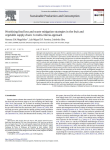
Article
Although reducing food loss and waste (FLW) is a global concern, there is a scarcity of literature devoted to the selection of suitable mitigation strategies. Previous studies are more focused on the disposal or valorisation of FLW, rather than [...]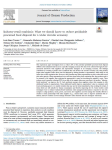
Article
L.R. Trento ; G.M. Pereira ; C.J. Chiappetta Jabbour ; N.O. Ndubisi ; V. Mani ; M. Hingley ; M. Borchardt ; J.U. Gustavo ; M. de Souza |This exploratory paper investigates how to reduce 25% of the potential perishable processed food disposal (PPFD) in the industrial-retail sector in a specific emerging economy The data were collected through 28 semi-structured interviews with su[...]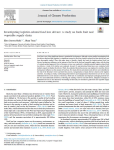
Article
Investigating logistics-related food loss drivers: a study on fresh fruit and vegetable supply chain
Food loss is one of the significant threats to sustainable development. Although various studies investigating food loss drivers disclosed that logistics is a significant reason for food loss, logistics-related food loss drivers have not been th[...]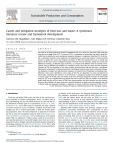
Article
One third of all food produced for human consumption ends up as food loss and waste (FLW) each year along the food supply chain (FSC). To prevent FLW, it is paramount to understand why food is being discarded and to identify the most appropriate[...]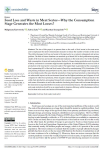
Article
The aim of this paper is to present data on the scale of food waste in the meat sector and to emphasize the need to disseminate measures to reduce the number of losses in this sector. The article discusses food loss and waste in the meat sector [...]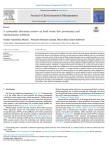
Article
Several initiatives have been proposed to address food waste and loss issues and support stakeholders throughout the food chain. However, the literature still lacks a review paper that compiles methods, practices, and solutions to reduce food wa[...]
Article
C. Chauhan ; A. Dhir ; M.U. Akram ; J. Salo |This study examines the state of the art of the literature in the domain of food loss and waste (FLW) in food supply chains (FSC). The authors used a systematic literature review (SLR) approach to examine and synthesise the findings of the exist[...]
Article
About 30% of food produced globally is lost or wasted along the food supply chain. In this sense, the objective of this research is to identify and systematize scientific publications relating food losses and wastes with solutions based on the c[...]
Article
Food loss and waste have become a serious global issue for business and society. To reduce food loss and waste, it is important to understand in depth their antecedents behind and consequences. This paper analyses the major antecedents and conse[...]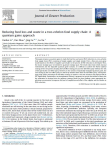
Article
This paper proposes a quantum game to study the food loss and waste (FLW) reduction in a two-echelon food supply chain (FSC) consisting of single supplier and single retailer. First, a Non-zero-sum game model based on the efforts of supplier and[...]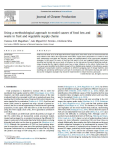
Article
Food loss and waste occur at all stages of the food supply chain. Since their causes are interconnected and may influence each other, then approaches with holistic supply chain perspectives are useful to map their relationships and guide the sel[...]







